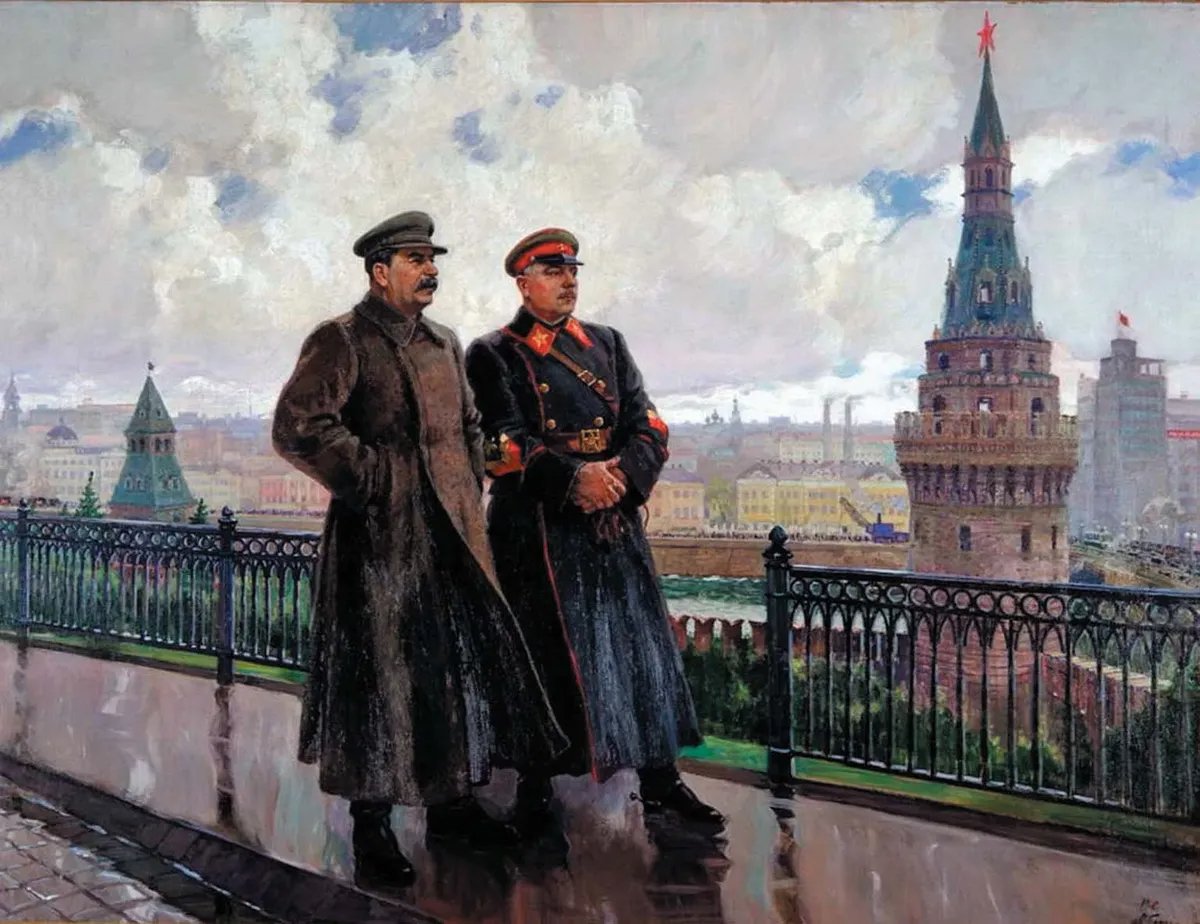Loveless re-Stalinisation
On Valentine’s Day, Tatyana Volynets, Children’s Ombudsperson for the Russian region of Tatarstan, posted a “Stalintine’s Day card” (Stalintinka) on her Telegram channel (the post was deleted the next day — editor’s note). The card, framed with a heart of red roses, featured a fragment of a famous 1938 socialist-realist painting by Soviet painter Aleksandr Gerasimov, in which two leading political figures of the Soviet state — Joseph Stalin and Kliment Voroshilov — are walking along the Kremlin wall against the background of a grey sky, gazing anxiously into the distance.
In her post, Volynets pointed out that on 14 February 1943, Soviet troops of the Southwestern Front had liberated Voroshilovgrad (modern-day Luhansk). “Today is a proper holiday, not some Valentine’s Day”, she wrote, reproaching the frivolous young people exchanging cards and gifts to celebrate the occasion. The author obviously intends her allegedly “tradition-steeped” postcard to serve as a challenge to the vapid and harmful cultural import from the West.

Stalin and Voroshilov in the Kremlin, 1938. Painting by Aleksandr Gerasimov. Source: Wikimedia
Valentine’s Day is indeed one of the more recent international holidays to grace the Russian calendar, and one that the population has readily embraced alongside other, established Soviet ‘gender’ holidays: 23 February (Defenders of the Fatherland Day) and 8 March (International Women’s Day). For the majority of Russians, it is simply another occasion for fun, an opportunity to express their feelings and do something nice for their loved ones.
This year, however, this imported holiday has encountered particular hostility from the Russian authorities. In place of a popular, albeit heavily commercialised, holiday, the state offers a morbid alternative. Through the “Stalintine’s Day card”, figures of the past tread heavily into the present, evoking purges and two wars — of the past and the present.
Celebrating violence and repression
Volynets’s aesthetic and political action is presented in the now familiar manner of the Russian authorities and their propagandists. The aesthetics of trolling and demonstrative inverting of the norm had become ingrained in the authorities’ practice long before the deformation of innocuous Valentine cards.
A well-known example of this style is the pre-war incident on Russian state TV when a presenter brought a bucket of excrement into the studio for a Ukrainian participant in a talk show. In another widely known case, following the invasion of Ukraine, reporter Anton Krasovsky suggested on air that Ukrainian children who spoke out against Russia should be “drowned” and “burned” as part of a re-education effort.
Although this statement cost Krasovsky his job, such examples showcase how the authorities are engaging in a deadly carnival of violence and repression, expecting the population to enjoy the performance.
The second problem with Valentine’s Day or Halloween, another holiday beloved by younger generations of Russians, is that they reflect the openness of the world, the free flow of ideas, cultural practices, and rituals. The recent firing of the director of the Tretyakov Gallery, Zelfira Tregulova — a person loyal to the government, but who tried to integrate Russian exhibition culture into the global artistic process — is a logical step in the general policy of closing borders and “re-territorialising” the country.
The populace must be connected to its homeland both in body and spirit, devoid of any enemy influence.
Moreover, the Russian parliament recently passed a law to protect the Russian language from foreign influences, pushing the country further onto the path of cultural isolation. Once again, as in the days of the Stalinist campaign against cosmopolitanism, words and names taken from other languages will be banned, with “pavements” (тротуары, derived from French trottoir) turning into “treadways” (топталищи, a word of Russian origin) and “French buns” being rebranded as “city buns”.
Pining for the Gulag
The notion that everything new is a threat to everything old, that all the problems of today stem from something significant being lost, and that the country will be made great again only after that loss has been compensated, feeds into the deeply reactionary policies of the state. The authorities are longing for the past, but for a very particular past. Looking back, the Kremlin recalls not the ideals of progress associated with the Soviet modernist project (i.e. the development of science, education, medicine, and culture), but rather the war and the Gulag. At the same time, this longing for the past is expressed through postmodernist simulacra — collections of dead clichés only brought to life through the energy of violence.
On the anniversary of the Battle of Stalingrad, at an event dedicated, predictably, to celebrating former greatness rather than reflecting on the tragedy and inhumanity of war, Putin referenced this collection of simulacra: “Again and again we have to repeal the aggression of the collective West. It is unbelievable but true. We are again being threatened by German Leopard tanks with crosses painted on the side. And once again they are going to fight against Russia on Ukrainian soil by means of Hitler’s followers and Banderites”.
Leopard tanks, which Germany did not produce during WWII (a prototype VK 16.02 Leopard was developed in 1942 but did not go into production — editor’s note), “Hitler’s followers”, and “Banderites” are all figments of Putin’s and his propagandists’ imagination. But the longing for the past, the reliance on its myths and symbols, and the desire to rebuild a once self-sufficient great country in an open, globalised world, all lie at the heart of the revanchism of the Kremlin and its older-generation supporters.
Zombie politics
Now, young people are being herded into the past as well. Recently, First Deputy Chair of the State Duma on Education, Yana Lantratova, has re-appeared in the media. Previously known for almost single-handedly creating a moral panic about the non-existent A.U.E. movement (a criminal subculture allegedly spread among younger people and united under the slogan “Thug Unity” — editor’s note), Lantratova has now, within the new patriotic agenda, proposed reintroducing Soviet-style lapel badges to school uniforms. She imagines the badges will become “an attribute of patriotism, of high moral principles, as it was in the Soviet Union”, when children proudly wore badges not only at school but also at home.
This assertion by Lantratova, who was only four years old when the USSR collapsed, could not be further removed from the truth. Children did not wear their badges at home and only rarely did so in school. Once again, we witness simulacra in places where, for want of a vision of the future, those in power construct a false reality using props from an imagined past.
In George A. Romero’s zombie films, the undead roam the world, lost to life, feeling nothing but anger and envy towards the living. Whenever possible, they turn the lives of the living into carnage.
The Russian leadership, much like zombies living in the past and hating those who it believes to have taken the past away from it, is imposing this carnage on its population by sending them to war. And now, political zombies are also trying to reach into the everyday lives of young people who just want to live, build their futures, and fall in love. The fact that children’s ombudspersons and lawmakers in charge of education are actively involved in these zombie politics is as ironic as it is disturbing.
Делайте «Новую» вместе с нами!
В России введена военная цензура. Независимая журналистика под запретом. В этих условиях делать расследования из России и о России становится не просто сложнее, но и опаснее. Но мы продолжаем работу, потому что знаем, что наши читатели остаются свободными людьми. «Новая газета Европа» отчитывается только перед вами и зависит только от вас. Помогите нам оставаться антидотом от диктатуры — поддержите нас деньгами.
By clicking the Support button, you agree to the processing of your personal data.
To cancel a regular donation, please write to [email protected]

